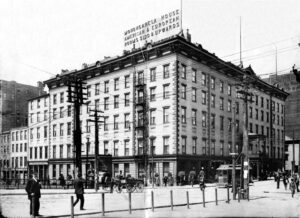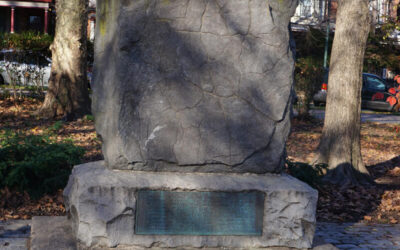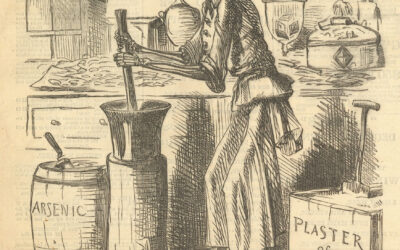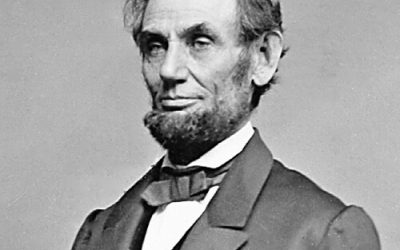#OnThisDay in 1861, President-Elect Abraham Lincoln delivered a unanimously well-received speech from the balcony of the Monongahela House during his whistle-stop trip to Washington, D.C.
On February 14, Lincoln arrived at the Pittsburgh, Fort Wayne, and Chicago Railroad Station in Allegheny City, en route to Washington for his inauguration. As thousands of onlookers crowded the rainy streets of Pittsburgh, Lincoln and his family proceeded across the St. Clair Street Bridge (modern Sixth Street) to the Monongahela House on Smithfield Street. It was here where a weary Lincoln, encouraged by the citizens of Pittsburgh, delivered an impromptu speech from the second floor of the hotel.
“I have great regard for Allegheny County, it is ‘the banner county of the Union,’ and rolled up an immense majority for what I, at least, consider a good cause. By mere accident, and not through any merit of mine, it happened that I was the representative of that cause, and I acknowledge with all sincerity the high honor you have conferred on me. I could not help thinking, my friends, as I traveled in the rain through your crowded streets, on my way here, that if all that those people were in favor of the Union, it can certainly be in no great danger – it will be preserved.”
On the morning of February 15, Lincoln addressed a much larger crowd of several thousand people – all who were eager to catch a glimpse of the newly elected President.
“Mayor Wilson and Citizens of Pennsylvania: I most cordially thank his Honor Mayor Wilson, and the citizens of Pittsburg generally for this flattering reception. It is the more grateful, because I know that, while it is not given to me alone, but to the cause which I represent, yet it is given under circumstances which clearly prove to me that there is good will and sincere feeling at the bottom of it. And here, fellow citizens, I may remark that in every short address I have made to the people, and in every crowd through which I have passed of late, some allusion has been made to the present distracted condition of the country. It is naturally expected that I should say something upon this subject… The condition of the country, fellow-citizens, is an extraordinary one, and fills the mind of every patriot with anxiety and solicitude.Notwithstanding the troubles across the river, (the speaker pointing southwardly, and smiling) there is really no crisis, springing from anything in the government itself. In plain words, there is really no crisis except an artificial one! What is there now to warrant the condition of affairs presented by our friends ‘over the river?’ Take even their own view of the questions involved, and there is nothing to justify the course which they are pursuing. I repeat it, then—there is no crisis, excepting such a one as may be gotten up at any time by designing politicians.My advice, then, under such circumstances, is to keep cool. If the great American people will only keep their temper, on both sides of the line, the troubles will come to an end, and the question which now distracts the country will be settled just as surely as all other difficulties of like character which have originated in this government have been adjusted. Let the people on both sides keep their self-possession, and just as other clouds have cleared away in due time, so will this, and this great nation shall continue to prosper as heretofore…”
Shortly after Lincoln delivered his address, he returned to Allegheny City and boarded a train for Cleveland. The President’s words proved to be erroneous, as tragically tested less than two months later when the nation went to war with itself.
Credit: Civil War Pittsburgh





0 Comments